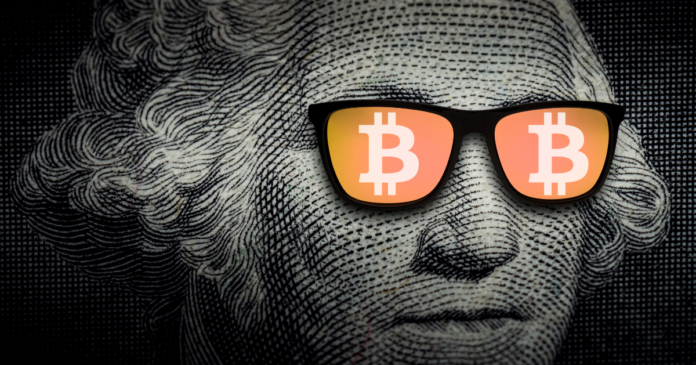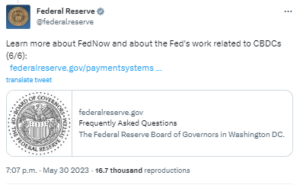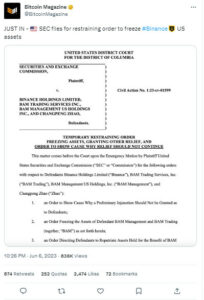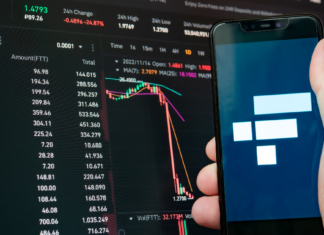When we examine the previous statements of the SEC’s CEO and the broader context, it becomes apparent that this decision implies a recognition of their defeat in attempting to regulate Bitcoin.
This defeat stems from the decentralized nature of Bitcoin, which renders it immune to regulatory efforts, with one exception: El Salvador. Additionally, the SEC’s recent attack on Binance appears to serve alternative motives beyond the supposed concerns over compliance. In this article, we will explore the reasons behind these conclusions and potential consequences for the sector.
Why El Salvador Has Been Able to Regulate Bitcoin and Not The US?
The SEC’s decision to classify certain tokens as securities can be seen as a tacit defeat against Bitcoin. They just realized it’s impossible to “regulate” Bitcoin the way they want.
Let’s be honest, what the FED really wants, with the Binance lawsuit, is to restrict the purchase of crypto assets, including bitcoin. They know that if they restrict the largest exchange, the others will do it too. If they really wanted to regulate the buying and selling of these assets, they would talk directly to each of the related companies, not to whoever sells them.
The motive behind this persecution of the most important exchanges is to pave the way for the successful adoption of FedNOW, the CBDC that the FED will soon bring out so that it does not happen to them like Nigeria whose adoption of their CBDC was a resounding failure.
Source: Twitter
On the other hand, what El Salvador did was a real regulation. Since it gave the necessary tools (legal framework, specialized education, and an official wallet) to its citizens to optionally adopt Bitcoin, making it the second official currency after the dollar. In short, the U.S. wants to bring down bitcoin while countries like El Salvador, or other cryptocurrency-friendly countries, want to progressively adapt it to their economy.
Why Bitcoin is Practically Impossible to Destroy?
Unlike traditional financial systems, Bitcoin operates on a network of nodes spread across the globe, making it virtually impossible for any central authority, including the SEC, to control or manipulate. The sheer number of Bitcoin nodes serves as a testament to its decentralized structure. According to Bitnodes, there are currently almost 17,000 Bitcoin nodes participating in securing the network, any attempt to regulate or control Bitcoin becomes an exercise in futility. This is what makes it practically impossible to eliminate. Even if there is a worldwide shutdown of the internet, there are Bitcoin nodes managed from space.
Furthermore, the different types of energy sources utilized by Bitcoin nodes and miners underscore the resilience of the network. Bitcoin mining operations are not reliant on a single type of energy, mitigating concerns about environmental impact or the concentration of power. From renewable energy sources like solar and wind to more traditional methods, Bitcoin mining represents a diverse range of energy consumption that further enhances its resistance to regulation. In this case, El Salvador just made a huge announcement about this.
Source: Twitter
But even when the SEC knows about this, they will continue to target Binance and other major crypto companies as the main enemies of “dollar stability”.
Contrary to the SEC’s expectations, Binance’s stablecoin, BUSD, has maintained its parity with the dollar despite the regulatory storm. Drawing parallels with the incident involving USDC a few months ago. Where concerns were raised about its stability, BUSD’s continued stability only strengthens Binance’s position.
The Significance of Binance US and Global Business
Although the SEC’s attack on Binance may have caused ripples of concern, its impact should not be overstated. Binance US, which represents the exchange’s presence in the United States, accounts for a relatively small percentage of Binance’s overall business worldwide. According to CoinGecko, Binance US is the 7th biggest centralized exchange, having a 24-hour trading volume of $246 million, and the international version has $11,495 million.
So, the majority of Binance’s operations occur beyond the jurisdiction of the SEC. This will allow the exchange to maintain its position as a global leader in the cryptocurrency market. While regulatory scrutiny is a hurdle, it does not pose an existential threat to Binance’s operations or its commitment to supporting the broader cryptocurrency community.
Source: Twitter
Continued Attacks and Consequences
The SEC’s attacks on Binance are likely to persist in the foreseeable future. However, Binance has consistently proven its ability to honor massive withdrawals and navigate regulatory challenges. This resilience provides reassurance to users and investors alike, ensuring that their funds remain secure. Nevertheless, the continued assault on Binance and other industry players creates uncertainty that drives away potential investments.
Innovation in the crypto industry will continue, it will just move to another place.
⬆️ For more cryptocurrency news, check out the Altcoin Buzz YouTube channel.
⬆️ Our popular Altcoin Buzz Access group generates tons of alpha for our subscribers. And for a limited time, it’s Free. Click the link and join the conversation today.































